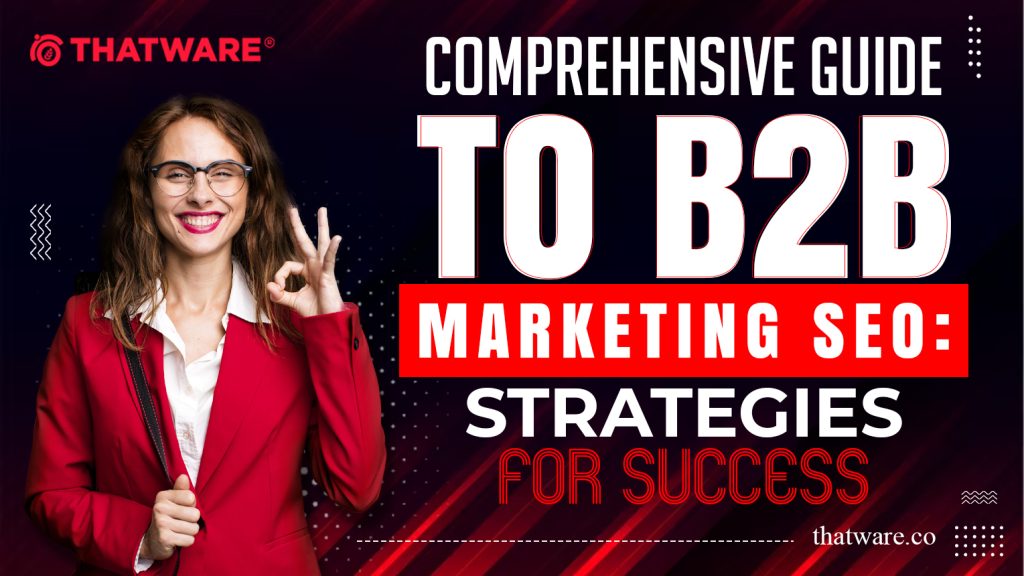SUPERCHARGE YOUR ONLINE VISIBILITY! CONTACT US AND LET’S ACHIEVE EXCELLENCE TOGETHER!
In the world of B2B marketing, search engine optimization (SEO) is a critical component of a successful digital marketing strategy. It not only helps businesses increase their online visibility but also drives organic traffic and generates high-quality leads. However, B2B SEO can be a complex and multifaceted process, and to truly succeed, you need a well-defined approach. In this blog, we will delve into the world of B2B marketing SEO and provide you with a detailed strategy for success.

- Understanding B2B SEO
Before diving into the strategies, let’s first understand what B2B SEO is and why it matters. B2B SEO refers to the practice of optimizing your website and online content to rank higher in search engine results for keywords and phrases relevant to your business. Unlike B2C (business-to-consumer) SEO, which focuses on targeting individual consumers, B2B SEO is tailored to attract other businesses and decision-makers. B2B search behavior is driven by research, comparison, and long-term value rather than impulse. Buyers often seek detailed information, proof of expertise, and clear solutions to complex challenges. This makes content depth, keyword intent, and authority far more important than broad visibility alone. When done correctly, B2B SEO helps businesses connect with qualified decision-makers at every stage of the buying process.
- Keyword Research and Strategy
The foundation of any successful B2B SEO campaign is thorough keyword research. Identify the keywords and phrases that potential B2B customers are using to search for products or services in your industry. Tools like Google Keyword Planner, SEMrush, and Ahrefs can help you discover valuable keywords.
Once you have a list of keywords, create a keyword strategy that includes:
- Primary keywords: High-traffic, high-relevance keywords that are central to your business.
- Secondary keywords: Related keywords that provide additional context and depth to your content.
- Long-tail keywords: Specific, often conversational phrases that address niche topics within your industry.
- On-Page SEO
On-page SEO involves optimizing individual web pages to improve their search engine rankings. Key on-page SEO elements to focus on include:
- Title Tags: Craft compelling and keyword-rich titles for each page.
- Meta Descriptions: Write informative and concise meta descriptions that encourage clicks.
- Header Tags (H1, H2, H3, etc.): Use header tags to structure your content and incorporate keywords.
- Content Optimization: Create high-quality, informative content that incorporates your target keywords naturally.
- Internal Linking: Link relevant pages within your website to improve navigation and user experience.
- Content Creation and Marketing
Content is king in the world of SEO. To attract and engage B2B customers, create informative, valuable, and relevant content. Consider these content types:
- Blog Posts: Regularly publish blog posts that address industry trends, challenges, and solutions.
- Whitepapers and eBooks: Offer in-depth resources that showcase your expertise and capture leads.
- Case Studies: Highlight successful projects and demonstrate your value to potential clients.
- Videos and Webinars: Utilize multimedia content to explain complex concepts or showcase products.
- Infographics: Visualize data and information to make it more digestible.
- Technical SEO
Technical SEO ensures that your website is optimized for search engine crawlers and user experience. Key technical SEO elements include:
- Site Speed: Optimize page load times for both desktop and mobile users.
- Mobile Optimization: Ensure your website is responsive and mobile-friendly.
- XML Sitemap: Submit a sitemap to search engines to help them crawl your site efficiently.
- Schema Markup: Use structured data to provide search engines with additional information about your content.
- SSL Certificate: Secure your website with HTTPS to boost trust and rankings.
- Link Building
Quality backlinks from authoritative websites are a significant ranking factor. Develop a link-building strategy that includes:
- Guest Posting: Contribute guest posts to relevant industry publications.
- Partner Outreach: Collaborate with partners and suppliers for mutual link placement.
- Content Promotion: Share your content on social media and email newsletters to attract natural backlinks.
- Broken Link Building: Find broken links on authoritative websites and offer your content as a replacement.
- Monitoring and Analytics
Regularly monitor your B2B SEO efforts using tools like Google Analytics and Google Search Console. Track key metrics such as organic traffic, keyword rankings, click-through rates, and conversion rates. Analyze this data to identify areas for improvement and adjust your strategy accordingly.
Effective Strategies for B2B Marketing SEO Success:
- Develop a Comprehensive SEO Strategy:
To achieve success in B2B marketing SEO, companies need to develop a comprehensive SEO strategy that encompasses keyword research, on-page optimization, content marketing, link building, and technical SEO. By aligning these strategies with their business goals and target audience needs, B2B companies can maximize their online visibility and lead generation efforts.
- Understand Your Target Audience:
Understanding your target audience is crucial for effective B2B marketing SEO. Conduct market research to identify your ideal clients, their pain points, challenges, and search behavior. By gaining insights into their needs and preferences, you can create tailored content and optimize your website to address their specific requirements and attract qualified leads.
- Create High-Quality Content:
Content is king in B2B marketing SEO. Focus on creating high-quality, informative, and engaging content that provides value to your target audience. Use a mix of formats, such as blog posts, whitepapers, case studies, and videos, to cater to different preferences and learning styles. Incorporate relevant keywords naturally into your content to improve its visibility in search engine results and attract organic traffic.
- Build Relationships and Authority:
Building relationships and authority within your industry is essential for B2B marketing SEO success. Network with influencers, industry experts, and thought leaders in your niche to gain exposure and credibility. Collaborate on content projects, participate in industry events and webinars, and contribute guest posts to reputable websites to establish your brand as a trusted authority in your field.
- Monitor and Measure Performance:
Monitor and measure the performance of your B2B marketing SEO efforts using tools like Google Analytics, Google Search Console, and SEO software. Track key metrics such as organic traffic, keyword rankings, conversion rates, and backlink acquisition to evaluate the effectiveness of your strategies and identify areas for improvement. Use data-driven insights to refine your SEO approach and optimize your website for better results.
Align SEO with the Buyer’s Journey
One of the biggest mistakes B2B marketers make is treating SEO as a checklist rather than a journey that mirrors the decision-making path of their buyers. SEO shouldn’t stop at generating traffic. It should guide prospects from awareness to consideration and finally to conversion.
Start by mapping your content to each stage of the funnel. Top-of-funnel content should answer broad, problem-aware queries—think blog posts, industry trend analyses, and educational videos. Mid-funnel content should address solution-aware audiences—whitepapers, comparison guides, and case studies work well here. Bottom-of-funnel content must help buyers justify their decisions—this could include pricing pages, product FAQs, or integration walkthroughs.
Don’t just rank; resonate. Use language your audience uses. Speak to their priorities, pressures, and business goals. It’s not just about optimizing for search engines but optimizing for real decision-makers who have real KPIs to meet.
Also, involve your sales team. They’re on the front lines, hearing objections and concerns daily. That feedback is a goldmine for creating content that’s not only keyword-rich but conversation-ready.
In B2B, trust is currency. Make your SEO strategy part of a larger effort to build authority, foster relationships, and move leads down the pipeline with confidence. This approach turns SEO into more than traffic—it becomes a growth engine that drives qualified leads, nurtures intent, and supports long-term revenue goals.
How Buyer Journey SEO Keywords Guide Decision-Makers from Search to Sale
In B2B marketing, prospects rarely convert after a single search. Their needs evolve as they move from problem discovery to solution evaluation and finally to purchase decisions. This is where buyer journey SEO keywords play a vital role, helping businesses align search visibility with genuine buying intent rather than surface-level traffic.
During the awareness stage, decision-makers search for information that clarifies challenges, risks, or industry trends. These early-stage buyer journey SEO keywords are largely informational and signal research-driven intent. Educational blog posts, insight-led articles, and practical guides perform best here, allowing brands to build credibility while answering fundamental questions.
As prospects advance into the consideration stage, search behavior becomes more focused and solution-oriented. Queries often include platforms, tools, comparisons, and methodologies. Content such as detailed solution pages, comparison guides, case studies, and whitepapers aligns well with this phase, ensuring visibility when buyers actively evaluate their options.
At the decision stage, intent becomes action-driven. Searches now include pricing details, service capabilities, implementation timelines, or provider-specific terms. Optimized service pages, FAQs, demo pages, and onboarding resources address these needs directly. Targeting buyer journey SEO keywords at this stage reduces friction, builds confidence, and supports faster decision-making.
When SEO strategies are structured around the buyer journey, lead quality improves significantly. Prospects arrive informed, sales conversations become more productive, and conversion rates increase. Rather than chasing traffic volume alone, this approach positions SEO as a strategic growth channel that supports long-term revenue, trust, and sustainable B2B success.
Real Business Growth Starts with the Right SEO Partner
At the core of every thriving business in New Plymouth is a strong digital foundation—and that begins with strategic, well-executed SEO. But here’s the truth: not all SEO services are created equal. While many promise rankings, few deliver long-term growth and meaningful engagement. At ThatWare, we go beyond the vanity metrics to focus on what really moves the needle for your business.
Whether you’re a small local business looking to dominate your niche or an established brand aiming for national visibility, our approach adapts to your goals, your audience, and your unique market position. That’s why many of our clients view us not just as another seo company in New Plymouth, but as a strategic extension of their team.
Unlike most cookie-cutter approaches, we prioritize understanding your business inside-out. From competitor behavior to customer search intent, we align every campaign with the nuances that make your brand different. Our team combines technical know-how with creative insight, ensuring your website doesn’t just rank—but converts visitors into loyal customers.Working with an seo agency in New Plymouth shouldn’t feel like outsourcing. It should feel like teaming up with a growth partner who genuinely cares about your success. That’s exactly what we offer. We’re here to put your business in front of the right people, in the right places, at the right time.
Conclusion
B2B marketing SEO is an ongoing process that requires dedication, patience, and a well-defined strategy. By understanding your target audience, conducting thorough keyword research, optimizing your website and content, and actively building your online presence, you can increase your visibility, generate leads, and ultimately, drive business growth in the competitive B2B landscape. Stay committed to refining your approach and adapting to evolving search engine algorithms to maintain long-term success in the world of B2B SEO.

